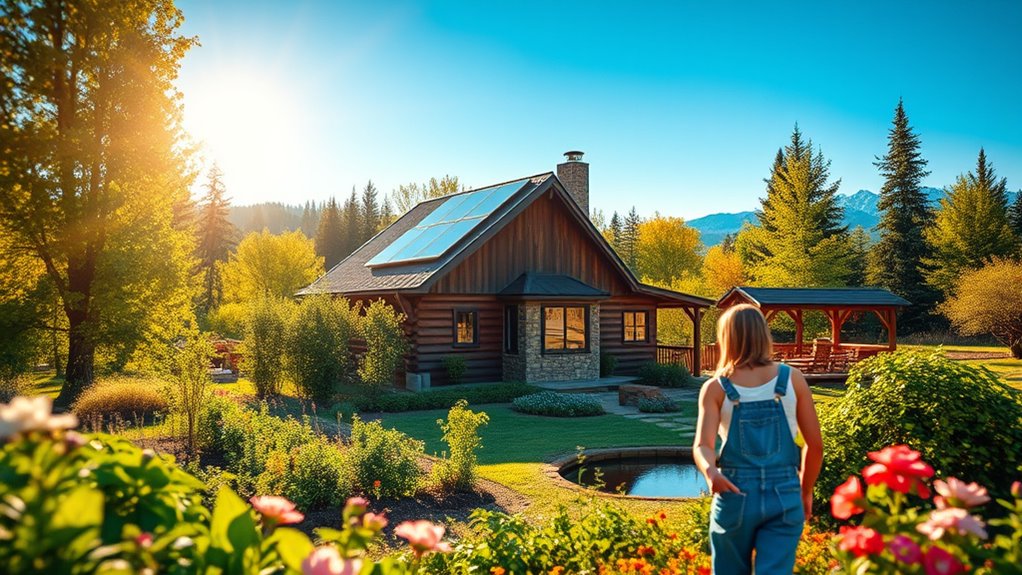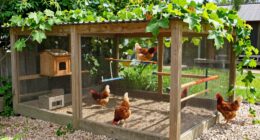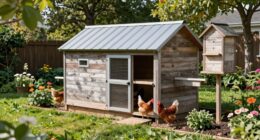Living off-grid might seem impractical or overwhelming at first, but it’s more accessible than you think, especially if you value independence and sustainability. While it requires effort and planning, it can also bring a sense of freedom and connection to nature that many find rewarding. Before making a move, consider whether your lifestyle, skills, and resources align with the demands of off-grid living. Curious about whether this lifestyle suits you?
Key Takeaways
- Assess your willingness to adopt a self-sufficient lifestyle, including managing renewable energy and water systems independently.
- Evaluate your comfort level with solitude, minimal connectivity, and hands-on skills like repair and gardening.
- Consider the financial implications of land, utilities, and infrastructure costs for off-grid setups.
- Ensure you understand local zoning laws and regulations to maintain legal compliance.
- Reflect on personal priorities such as independence, connection to nature, and readiness for lifestyle changes.
Understanding the Concept of Off-Grid Living
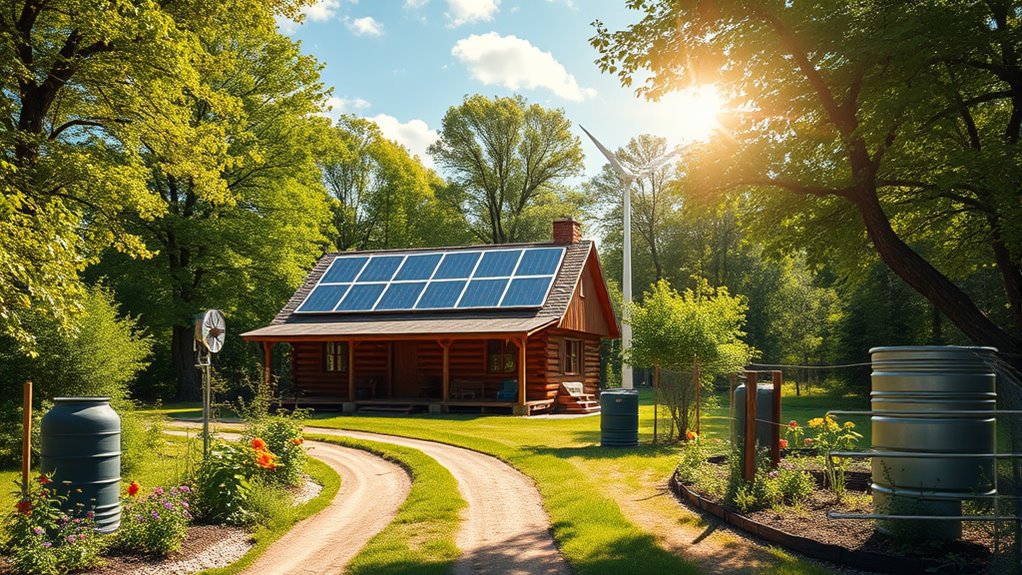
Have you ever wondered what it truly means to live off-grid? It’s about independence from traditional utilities, relying on renewable sources like solar energy to power your home. Solar panels convert sunlight into electricity, giving you a sustainable energy supply. Additionally, implementing bucolic beauty and natural landscapes can enhance your off-grid experience by providing serene surroundings and opportunities for outdoor activities. Water harvesting is equally essential—you collect rainwater or find alternative sources to meet your water needs. This approach reduces dependence on municipal water and power systems, allowing you to create a self-sufficient lifestyle. Off-grid living combines these methods with other sustainable practices to minimize your ecological footprint. It’s about taking control of your resources and living more intentionally. Understanding these basics helps you see whether stepping off the grid aligns with your goals for environmental stewardship and personal freedom.
The Key Benefits of Going Off-Grid

Living off-grid offers numerous advantages that can considerably enhance your quality of life and sense of independence. One major benefit is harnessing solar power, which allows you to generate clean, renewable energy right at home. This reduces your reliance on traditional utilities and can substantially lower your energy bills.
Additionally, water independence enables you to collect and store your own water, freeing you from municipal water systems and potential shortages. These self-sufficient systems give you greater control over your resources and reduce your environmental footprint.
Plus, living off-grid fosters a deeper connection to nature and encourages sustainable habits. As a result, you enjoy a more autonomous lifestyle, peace of mind, and a sense of empowerment that comes from managing your own energy and water needs.
Common Challenges and How to Overcome Them
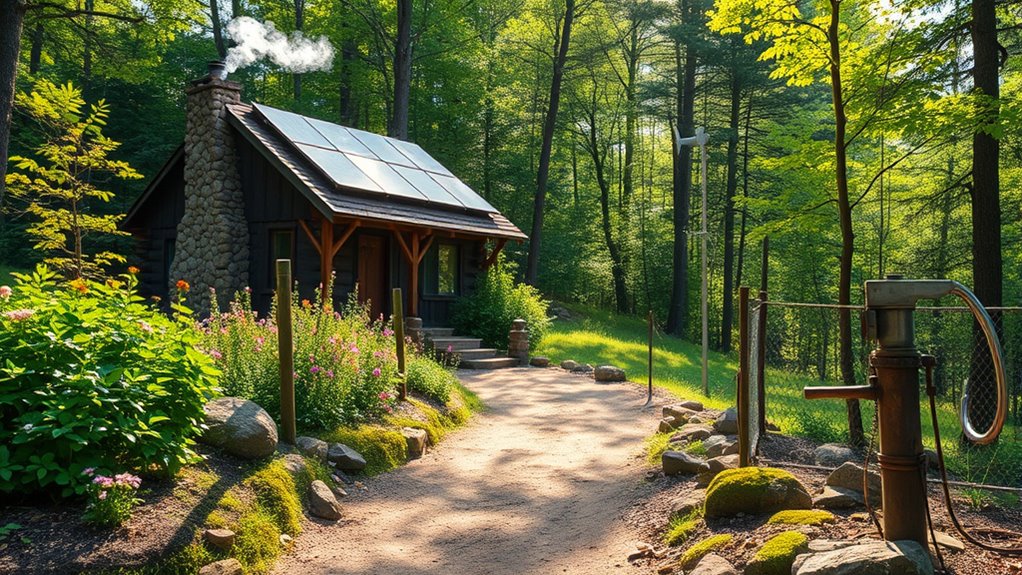
Living off-grid means you’ll face challenges like managing limited resources, handling emergencies, and staying self-sufficient. These issues require planning and quick thinking to keep things running smoothly. For example, ensuring good air quality in your living space is crucial, which can be achieved through the use of air purifiers, especially in areas prone to pollutants or allergens. Let’s explore how you can overcome these common obstacles confidently.
Managing Limited Resources
How do you make the most of limited resources when off-grid living? Effective resource management is key to sustainability. Focus on water conservation by collecting rainwater, fixing leaks, and using low-flow fixtures.
To optimize your resources, consider these steps:
- Prioritize water-saving techniques and monitor your water use regularly.
- Use composting toilets to reduce water needs and manage waste efficiently.
- Implement energy-efficient appliances to conserve electricity.
- Plan your resource use carefully, avoiding waste and maximizing renewables.
- Be aware of signs of spoilage in stored consumables to prevent waste and ensure safety.
Handling Emergency Situations
When emergencies strike in off-grid settings, swift and effective action can mean the difference between safety and disaster. That’s why emergency preparedness is vital. Incorporating essential oils into your safety plan can provide natural remedies and calming effects during stressful situations. You should have a solid contingency plan in place, covering scenarios like medical emergencies, fires, or severe weather. Keep a well-stocked emergency kit with first aid supplies, tools, and essentials. Know how to quickly access communication devices or alternative methods to call for help if traditional signals fail. Regularly review and update your plans, ensuring everyone in your household understands their roles. Being proactive with contingency planning reduces chaos during crises and helps you respond calmly and efficiently. Preparing for emergencies isn’t just smart—it’s essential for your safety when living off-grid.
Maintaining Self-Sufficiency
Maintaining self-sufficiency in an off-grid setting can present a range of challenges that test your resourcefulness and planning. To stay on track, focus on these key areas:
- Solar Power: Ensure your solar panels are efficient and well-maintained to meet your energy needs, especially during cloudy days. Incorporate solar efficiency improvements and regular inspections to maximize energy output.
- Water Conservation: Implement water-saving techniques like rainwater harvesting and low-flow fixtures to extend your water supply.
- Food Production: Grow a diverse garden and consider preserving foods to reduce reliance on outside sources.
- Maintenance Skills: Develop basic skills for repairing equipment and managing systems, so you’re prepared for unexpected issues.
Essential Skills and Knowledge for Off-Grid Success
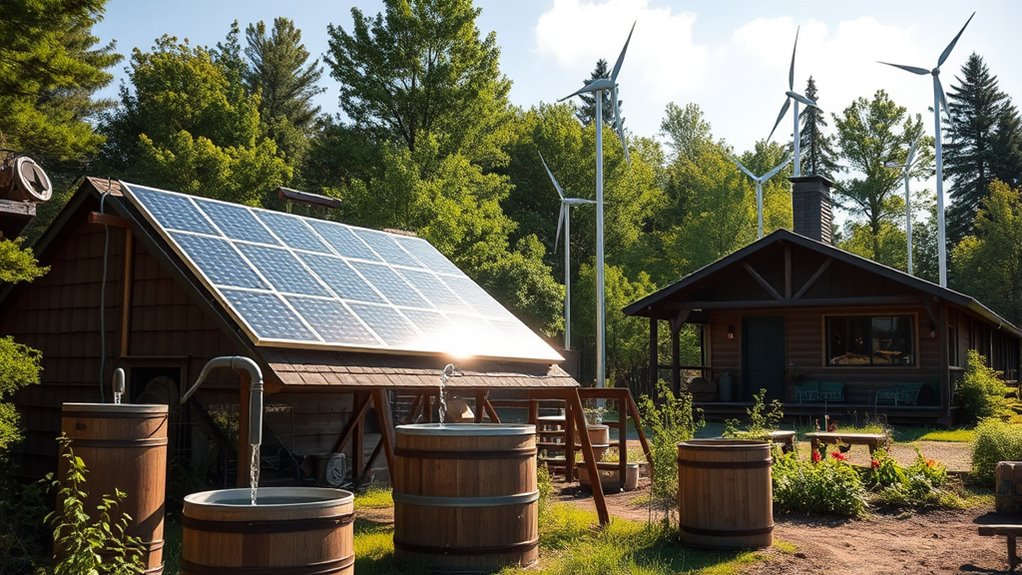
To thrive off-grid, you need a solid foundation of practical skills and essential knowledge. First, understanding solar power is vital—you should know how to set up, maintain, and troubleshoot your solar panels to generate reliable electricity. Suction power and filtration systems are also key components to ensure your water remains clean and safe for drinking and everyday use. Equally important is water filtration; you must learn how to identify safe water sources, operate filtration systems, and guarantee your water remains clean and safe for drinking and everyday use. Basic electrical skills help you optimize your system’s efficiency and handle minor repairs. Knowledge of renewable energy sources, basic carpentry, and gardening will further support your independence. Developing these skills takes time, but mastering them assures you can confidently manage your off-grid lifestyle without relying heavily on external services.
Assessing Your Lifestyle and Readiness
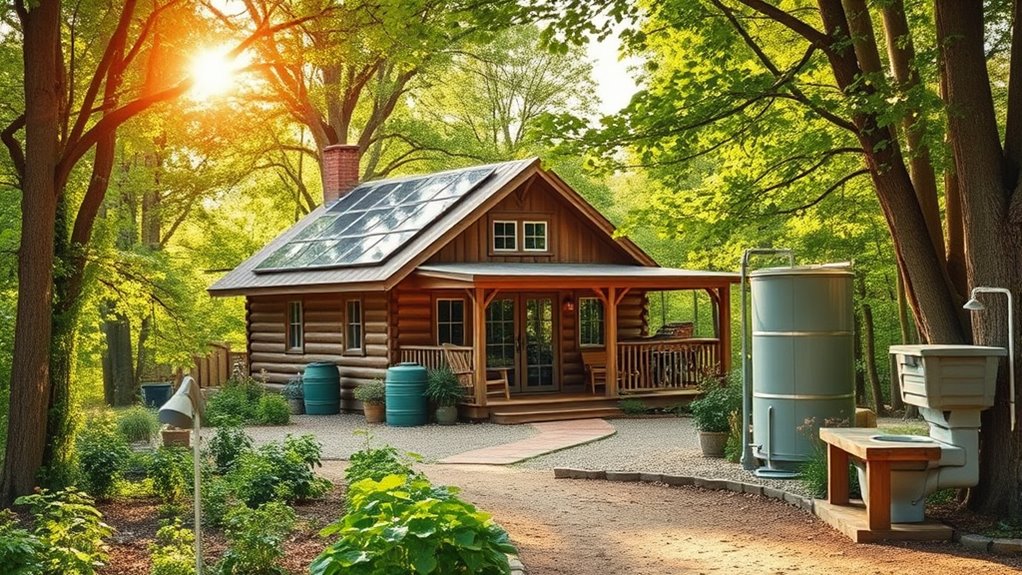
Before committing to off-grid living, you need to honestly evaluate your current lifestyle and readiness. An urban lifestyle often relies heavily on technology and amenities, making it challenging to adapt.
Consider these factors:
Reflect on these key considerations before making the off-grid leap.
- Your dependence on technology and how comfortable you’re reducing it
- Your ability to handle the solitude and self-sufficiency needed off-grid
- Your willingness to adapt to a simpler, less connected lifestyle
- Your experience with outdoor skills or willingness to learn them
If you’re used to constant connectivity and modern comforts, transitioning could be difficult.
Reflect on whether you’re ready to embrace minimalism, self-reliance, and a significant lifestyle change.
Being honest about your habits and expectations is key to determining if off-grid living suits you. For many, understanding the Bedroom environment and how it aligns with their lifestyle goals can also influence their decision.
Planning and Preparing for Off-Grid Life
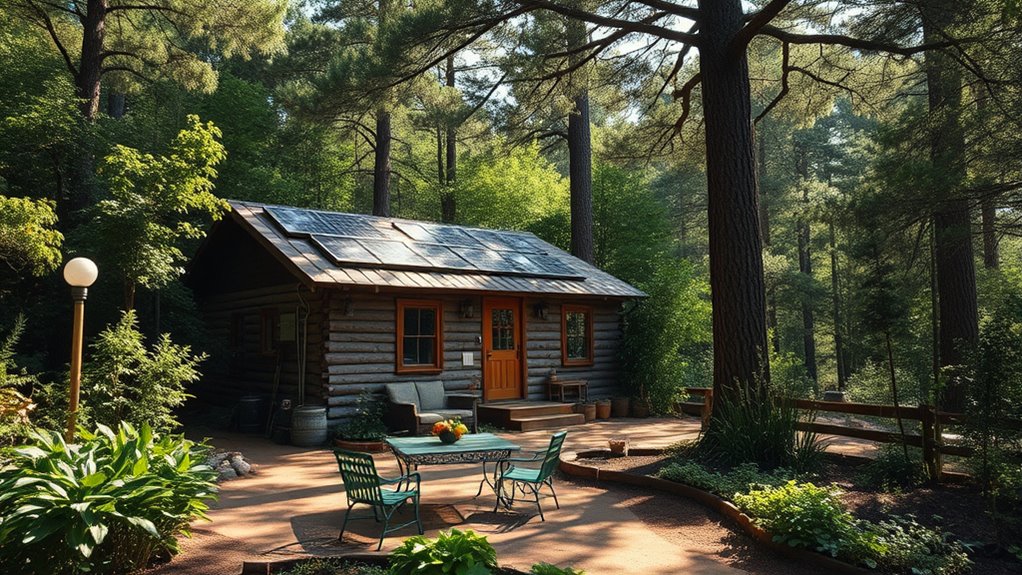
You need to carefully choose your site to guarantee it meets your energy, water, and access needs. Making the right selection now will save you headaches later.
Once you’ve picked a spot, check off all essential preparedness tasks to set a solid foundation for off-grid living. Consider researching land and utility costs to understand the financial implications of your chosen location.
Site Selection Strategies
Choosing the right site is essential for a successful off-grid lifestyle, as it lays the foundation for sustainability and comfort. When selecting a remote property, consider factors like accessibility, natural resources, and climate. A new sentence with AI-driven security systems and the rest of the sentence. Check local zoning regulations to ensure your plans comply with land use laws and building codes. Here are key strategies:
- Research zoning restrictions to avoid future legal issues.
- Prioritize properties with reliable water sources or easy access to water.
- Evaluate sunlight exposure for solar power efficiency.
- Assess land topography for suitable construction and drainage.
Essential Preparedness Checks
Starting your off-grid life requires thorough planning and preparation to guarantee you’re ready for the challenges ahead. First, assess your energy needs and install reliable solar power systems to ensure a steady electricity supply. Properly sizing your panels and batteries is vital for consistent power.
Next, prioritize water filtration to provide safe drinking water; consider systems like reverse osmosis or sediment filters based on your water source. Check your water storage capacity and plan for potential contamination issues.
Additionally, develop backup plans for energy and water, such as portable generators or rainwater harvesting. Regular maintenance of your solar setup and filtration systems keeps everything running smoothly. The contrast ratio of your projector can also influence how well images appear in your home theater setup, especially in dark room conditions.
These essential preparedness checks help you build resilience and enjoy a sustainable, off-grid lifestyle with confidence.
Making the Decision: Is Off-Grid Living Right for You?
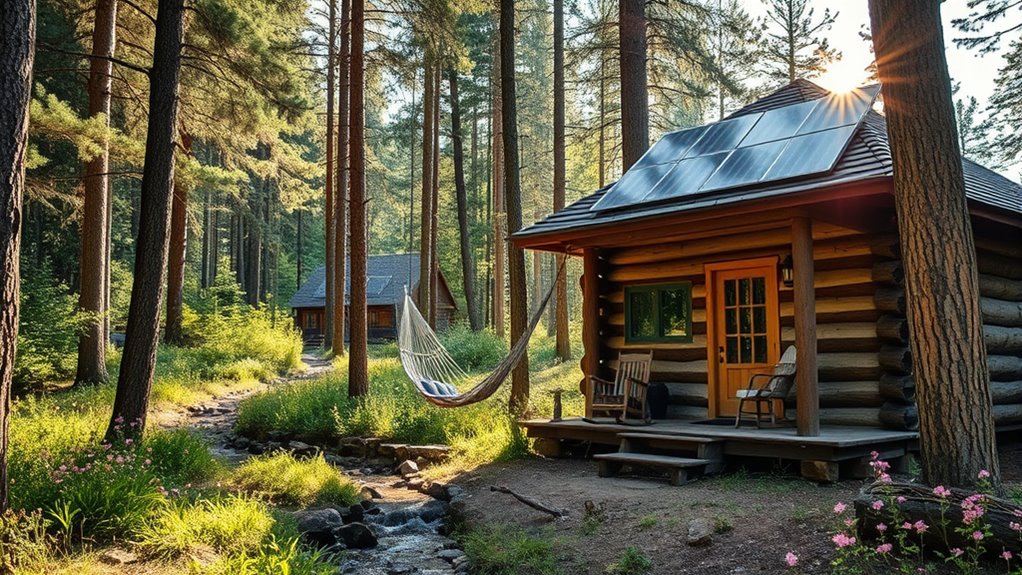
Deciding whether off-grid living is right for you involves honest self-reflection about your priorities, lifestyle, and willingness to adapt. Consider how well you match with urban compatibility and social integration. Ask yourself:
Assess your priorities and adaptability to determine if off-grid living truly suits your lifestyle.
- Do you crave the convenience of city amenities or prefer remote tranquility?
- Are you comfortable building a self-sufficient lifestyle or relying on community support?
- Can you handle potential social isolation or do you thrive on social interaction?
- Are you willing to adapt your daily routines to off-grid realities?
If you value independence but still want connection, find a community that supports off-grid living.
If social integration and urban conveniences matter most, off-grid living mightn’t be the right choice.
Be honest with yourself before making the leap. For those exploring alternative living options, participating in hackathons can foster innovative solutions and community connections.
Frequently Asked Questions
What Are the Legal Requirements for Off-Grid Living in My Area?
You need to verify your area’s zoning restrictions and building permits before off-grid living. Local regulations might limit where you can build or set up alternative systems. Contact your city or county planning office to understand specific rules.
Make sure to obtain necessary permits for structures and utilities. Staying informed helps you avoid legal issues and ensures your off-grid lifestyle is compliant with local laws.
How Much Does It Cost to Start an Off-Grid Lifestyle?
Starting an off-grid lifestyle costs vary depending on your setup. You’ll need to invest in solar power systems to generate electricity and water collection systems to guarantee a reliable water supply.
Initial costs can range from a few thousand dollars for basic setups to much more for advanced systems. Remember, ongoing maintenance and upgrades are part of the expense, but these investments give you independence from traditional utilities.
Can I Maintain Modern Conveniences While Living Off-Grid?
You can definitely enjoy modern conveniences off-grid, but it’s a bit like juggling fire—requires effort and planning. Solar energy systems power your appliances, providing reliable electricity, while water filtration guarantees clean, safe water.
With the right setup, you’ll maintain comforts like lighting, internet, and even refrigeration, all while living sustainably. Staying connected and comfortable off-grid isn’t just a dream; it’s entirely feasible with the right tools and mindset.
What Are the Best Locations for Off-Grid Homes?
You should consider locations like remote communities or mountain retreats for off-grid homes. These areas offer seclusion, natural resources, and space, making them ideal for sustainable living.
Look for spots with reliable sunlight for solar power, nearby water sources, and access to essential services.
Choosing a remote community or mountain retreat guarantees you enjoy privacy and tranquility while maintaining modern conveniences off the grid.
How Do I Ensure Reliable Internet and Communication Off-Grid?
Imagine living in a remote paradise where your only link to the world is a tiny satellite dish. To guarantee reliable internet and emergency communication, you should invest in satellite internet services, which provide coverage even in the most isolated spots.
Keep emergency communication devices like satellite phones handy, and consider backup options like radio transmitters. These steps help you stay connected, safe, and in control no matter how far off-grid you go.
Conclusion
Deciding to go off-grid is like planting a seed in untamed soil—you’ll need patience, care, and a willingness to nurture your new life. If you’re ready to embrace the wilderness, learn to dance with nature’s rhythms, and weather storms with resilience, off-grid living can become your sanctuary. But if your roots crave comfort and certainty, it might be better to stay on familiar ground. The choice is yours—will you take the leap into independence?

